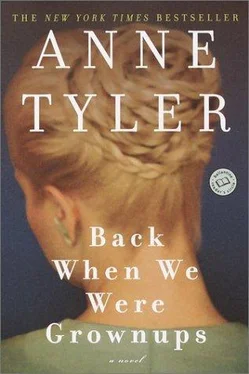“You get hold of the school directory…” Rebecca began. She spoke slowly; she was trying to cast her mind back. “You look up all the students who live near you…”
“I asked Peter who lived near us and he said he didn’t think anyone. But I’m not sure he knows. It doesn’t seem to me that he has any friends.”
“None at all?” Rebecca said.
“Well, he never gets any phone calls, at least.”
“Maybe boys just don’t phone,” Rebecca told her.
“Oh, you’re right; maybe they don’t.”
“It’s not as if you or I have had much experience with boys.”
“You’re right,” NoNo said again, and her voice turned thin and quavery. “I’m really not equipped for this, you know?”
“Oh, sweetheart, you’ll do fine,” Rebecca had said. “Don’t worry for an instant. Just call Patch or Min Foo and ask them about car pools, why don’t you.”
Now she leaned across the table to Joey. “Joey,” she said, “do you ever talk on the phone?”
“I talk with you, Gram.”
“With your friends, I mean. Do you ever get on the phone and talk with them in the evening?”
“Well, sure, if I need to know about a homework assignment or something.”
“But not just to talk for no reason.”
“No reason! Then why would I call?”
“Aha,” Rebecca said. She told Zeb, “NoNo thinks Peter doesn’t have any friends because nobody ever phones him.”
“He’ll be okay. Just give him time,” Zeb said. Which was probably what he told every parent who walked into his office, Rebecca reflected. He was helping Lateesha cut her pork chop, and he didn’t even look up as he spoke.
“This spinach dish—” Biddy was announcing. “Could I have people’s attention, please? This spinach dish contains a tiny bit of nutmeg, but the point is that you’re not supposed to taste it. It’s only meant to enhance the flavor of the spinach. Does anyone taste any nutmeg?”
Hard to tell, for as usual, the others were too busy arguing and interrupting each other. “ I think it’s delicious,” Rebecca told her.
But Biddy said, “I don’t know why I bother making the effort,” just as if no one had spoken. She snatched up the spinach dish and marched back to the kitchen.
Rebecca looked down at her plate for a second, and when she looked up again she found Zeb watching her. He said, “It’s just that you always say things are delicious. She didn’t mean any harm.”
“Well, I know that,” Rebecca said.
Then she said, “More pork chops, anyone? Who’d like another pork chop?” and the moment passed.
* * *
On Friday Min Foo and the baby went home, and Rebecca dropped the two children off along with a bag of groceries. From there she drove directly to a bookstore. “Do you have any books on Robert E. Lee?” she asked a salesclerk.
“Try Biography, over by the window.”
“Thank you.”
She crossed the store, pausing once or twice when something in another section caught her eye — a children’s book on ballet, which was Merrie’s current passion, and a collection of Holy Land photos that would make a very good birthday present for Alice Farmer. In Biography she found three books about Lee, one of them a paperback. She plucked that from the shelf and studied the portrait on the cover: Lee’s square-cut beard and disappointed gaze. He wasn’t someone she particularly admired. It was only that he represented the first and last extensive scholarly research she had ever undertaken. She had barely assembled her reference materials, was just starting to feel caught up in the project, when Joe Davitch walked into her life. Now the sight of Lee’s face brought back a swarm of memories: the musty smell of the Macadam College library; the sweetly rounded o ’s of her history professor, who came from Minnesota; and the thrilling crispness of brand-new textbooks and spiral-bound notebooks purchased from the school store.
A couple of feet away, a severe-looking woman with a tight bun of white hair selected a hardback and showed it to a girl in a miniskirt — her granddaughter, most likely. “Now, this would be a good choice,” she said. “The life of Charles Lindbergh.”
“But it’s, like, humongous,” the granddaughter said. “I’d totally never finish it before the start of classes.”
The woman somehow managed to grow taller as she stood there. “May I inquire,” she said icily, “what kind of voice that is you’re using?”
Rebecca knew exactly what kind of voice it was. She’d heard Dixon call it a surfer-girl voice. (Though why it should be needed in Baltimore, Maryland, and how that shallow, breathy tone could be advantageous — did it carry more easily over the sound of the waves, or what? — she couldn’t say.) But the granddaughter didn’t seem to have heard. “And besides,” she went on, “he’s, like, a guy. Guys’ biographies suck.”
“I beg your pardon,” the woman said, growing even taller.
“Well. Sorry, Grandma,” the girl said meekly.
The woman sniffed and replaced the book on the shelf.
Rebecca was impressed. Imagine having such authority! She herself might have drifted into a string of like s and totally s right along with the granddaughter, hardly noticing what she was doing. She had no sense of definition, was the problem. No wonder she’d ended up a whole different person!
She bought not only the Lee paperback but the two hardbacks as well, although she couldn’t afford them. When she set them on the counter, the salesclerk asked, “Will that be all?” and Rebecca said, “Yes. It will,” in a firm, declarative manner that (she realized too late) exactly duplicated the white-haired woman’s.
* * *
Some days were telephone days and other days were not. Did it work that way for everyone? Some days Rebecca’s phone rang nonstop, one caller tumbling over the heels of another, and other days you wouldn’t know she owned a phone.
On this particular afternoon the painter called; then the dentist’s office; then the man who inspected the furnace. Poppy’s physical therapist wanted to reschedule. Patch wanted to complain about Jeep. Min Foo wanted to list possible dates for the baby-welcoming.
A Mrs. Allen called to arrange for her husband’s fiftieth-birthday party. “This would be, oh, maybe sixty guests,” she said. “Or sixty-five. Let’s play it safe and say seventy.”
Rebecca wondered why people couldn’t figure these things out before they got on the line. But she said, “Seventy. All right.”
“It’s going to be a surprise.”
“Really,” Rebecca said.
She should have let that go, but in all good conscience, she couldn’t. “If you want my honest opinion,” she said, “surprise parties are guaranteed disasters. Is what I would call them.”
This made the plumber, flat on his back beneath the kitchen sink, snort and mutter, “Amen to that!” But Mrs. Allen was undeterred. “I’m thinking just drinks and canapés,” she went on blithely. “Sit-down dinners are so stuffy, don’t you agree?”
The Open Arms could not have managed a sit-down dinner for seventy; so Rebecca certainly did agree. They settled on the date and the deposit fee, after which she prepared to say goodbye, but Mrs. Allen moved on next to the subject of her husband’s midlife crisis. (His decision to try a hair transplant, his drastic weight-loss diet, his purchase of a sixteen-hundred-dollar set of golf clubs although that was cheaper, she supposed, than taking up with some dolly half his age.) Rebecca tiptoed across the kitchen, stretching the telephone cord to its limit, and turned the timer dial on the stove till it started dinging. “Oops! Gotta go!” she cried, and she hung up. “Some people think the phone is some kind of… hobby,” she told the plumber.
Читать дальше












